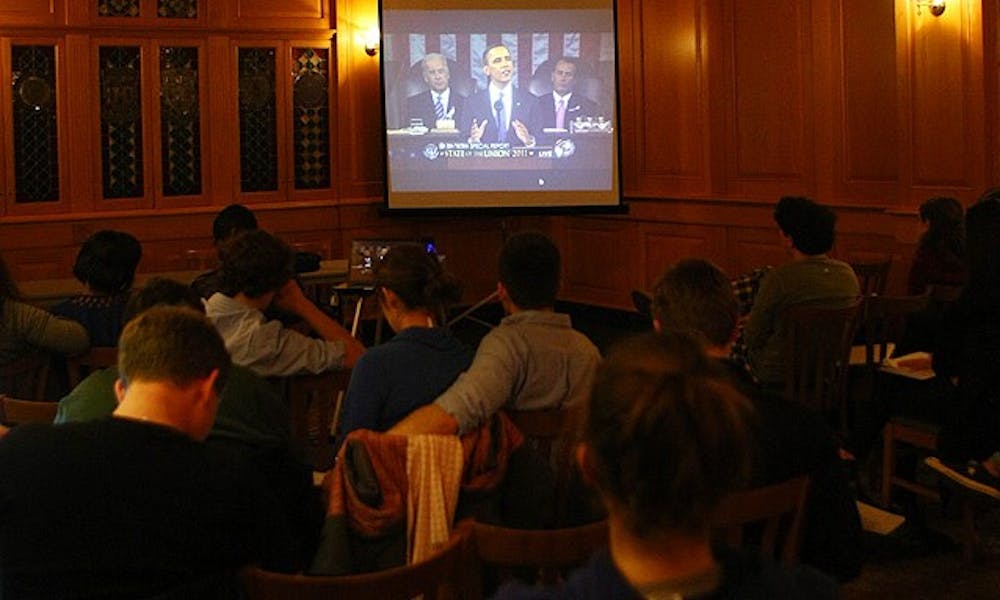President Barack Obama began his address to the American people Tuesday night with an eye on progress.
“The first step in winning the future is encouraging American innovation,” he said.
Obama largely focused his State of the Union speech on the theme of American jobs and global economic competition, from which he laid out his strategy for tackling issues such as education, environmental advancement, immigration reform and deficit reduction. He called for American citizens to embrace creativity and imagination in order to further innovation, which he said could define an ever unpredictable economy.
In an attempt to convey bipartisan civility in light of the recent shooting in Tucson, Ariz., many congressmen wore black and white ribbons and sat side-by-side with members of opposing parties. In the speech, the president called for future commitment to bipartisan cooperation, stating that the tragedy should remind the “American family” that progress can only be made through political synergy.
“We will move forward together, or not at all—for the challenges we face are bigger than party, and bigger than politics,” Obama said. “At stake right now is not who wins the next election—after all, we just had an election. At stake is whether new jobs and industries take root in this country or somewhere else.”
From there, Obama stressed the importance of regaining the country’s economic competitive edge and acknowledged the way in which employment opportunities have changed in the past three decades. At a time when American unemployment is hovering at approximately 9.4 percent while economies in countries such as India and China are booming, the president said he hoped for the country to reach a new level of development and research. He called for the present generation’s “Sputnick moment,” which he hopes to achieve through proposed investments in biomedical research, information technology and clean energy technology. He noted that the country must “break [its] dependence on oil with biofuels and become the first country to have one million electric vehicles on the road by 2015.”
Obama also presented his strategy for decreasing the deficit and maximizing tax dollars. His plan is to impose a five-year freeze on nonmilitary discretionary spending, which he said would involve cuts in expenditures in places such as the military and community action programs but also reduce the deficit by $400 billion over the next decade.
“Now, most of the cuts and savings I’ve proposed only address annual domestic spending, which represents a little more than 12 percent of our budget,” he explained. “To make further progress, we have to stop pretending that cutting this kind of spending alone will be enough. It won’t.”
Outside of his strategic focus on economic rejuvenation, there were many issues the president chose not to address, particularly gun control, Social Security and Medicare. The president also only briefly addressed the wars in Iraq and Afghanistan, but noted his intentions to bring troops in both countries home.
“This year, our civilians will forge a lasting partnership with the Iraqi people, while we finish the job of bringing our troops out of Iraq,” he said. “America’s commitment has been kept—the Iraq War is coming to an end.”
Obama added that he hoped the war in Afghanistan would result in an “enduring partnership” with the country through empowering its people.
On campus, students gathered for a watch party organized by the Duke Political Union, Duke Democrats and Duke College Republicans in the West Union Building.
President of Duke Democrats Ben Bergmann, a senior, said that although he thought the speech went well, he found nothing in it to be surprising.
“I think it was the speech everyone expected him to give in light of the new reality in Congress,” Bergmann said. “This was the first speech of the 2012 [presidential] campaign. I think he tried hard to move on from the divisiveness that was created by health care.”
Indeed, in his brief acknowledgement of the health care reform bill, the president said he was open to addressing the concerns of dissenters.
“Let me be the first to say that anything can be improved,” Obama said. “If you have ideas about how to improve this law by making care better or more affordable, I am eager to work with you. We can start right now by correcting a flaw in the legislation that has placed an unnecessary bookkeeping burden on small businesses.”
Duke College Republicans Chair Stephen Bergin, a senior, said he also found the speech to be within his expectations and noticed the president’s efforts to appeal to moderate voters.
“There was nothing particularly remarkable about it,” Bergin said. “I’m surprised that [Obama] didn’t [mention gun control laws], but at the same time, he’s not looking to start that fight now.”
Get The Chronicle straight to your inbox
Signup for our weekly newsletter. Cancel at any time.

